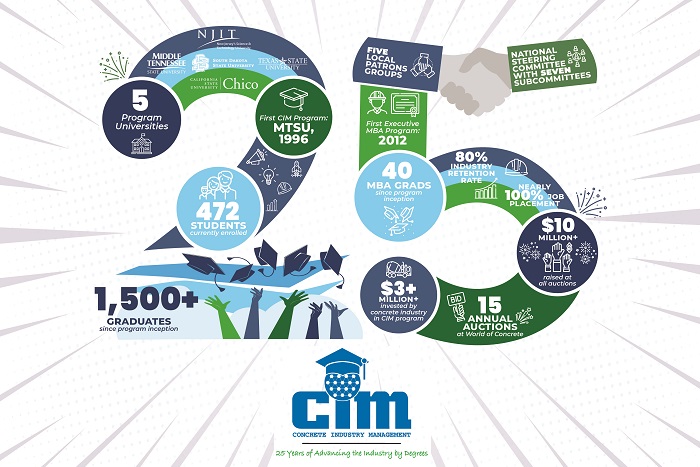 The Concrete Industry Management (CIM) program is a business-intensive program that awards students with a four-year Bachelor of Science degree in CIM. This year, the CIM Program Celebrates 25 Years. A first-of-its-kind college degree program for concrete construction in the United States, the CIM program ensures the industry has a continuous stream of professionals trained in concrete technology and management.
The Concrete Industry Management (CIM) program is a business-intensive program that awards students with a four-year Bachelor of Science degree in CIM. This year, the CIM Program Celebrates 25 Years. A first-of-its-kind college degree program for concrete construction in the United States, the CIM program ensures the industry has a continuous stream of professionals trained in concrete technology and management.
The National Steering Committee (NSC) of CIM, a national-level, broad-based industry coalition dedicated to the support of CIM institutions, has planned an anniversary celebration which will take place on Oct. 26 at the Embassy Suites Hotel Nashville in Murfreesboro, Tenn.
First introduced in 1996 with two students, the undergraduate program now includes nearly 500 students at program universities including Middle Tennessee State University (MTSU); California State University, Chico; Texas State University and New Jersey Institute of Technology. On Aug. 31, South Dakota State University’s Jerome J. Lohr College of Engineering held a ribbon cutting ceremony to officially announce it is now the 5th university in the country offering a degree in CIM.
To date, more than 1,500 students have graduated from CIM programs. All of these students have the skill set necessary to meet the growing demands of the progressively changing concrete industry.
“For the last 25 years, CIM has remained strong throughout the many changes in the economic climate,” said Eugene Martineau, Executive Director of CIM’s NSC. “I attribute our success to two things – the dedication of the National Steering Committee and the local patron groups. The NSC exemplifies how firmly entrenched the concrete industry is in CIM.”
CIM leadership
The leadership of NSC’s board of directors is comprised of ready-mix suppliers, admixture suppliers, concrete contractors, engineering firms, research organizations, and also trade associations. Their mission is to develop, support, promote and sustain a network of higher learning educational institutions with programs that produce graduates with degrees in CIM. The local patron groups are the backbone of the CIM program. These groups provide guest lecturers and sponsor field trips. They also hire students and graduates and provide financial support that matches or exceeds that of the NSC.
Seeing the need for concrete industry-specific executive education, the NSC launched an Executive MBA program. In the fall of 2012, the first class of students in the CIM MBA program at MTSU began. This unique degree program was the result of many years of close collaboration between MTSU, the NSC and companies in the concrete industry. The program expands the industry/academic partnership by bringing CIM to the business world through an executive-type MBA and stands alone in its focused curriculum on the concrete production and concrete construction industries. The first cohort graduated in December 2014. The program now allows for entry in any semester. Graduates can also combine it with the MBA Flex program to keep many options for courses available to students. For more information, visit the CIM MBA website.
About The CIM Program
Recognizing the need for people with enhanced technical, communication and management skills, the CIM program was developed in 1995. The individuals graduating from this program will have the skill set necessary to meet the growing demands of the progressively changing concrete industry of the 21st century. It is a business intensive program. It also provides solid management expertise that graduates can use in any industry. However, it has been developed specifically for the concrete industry. The program gives students many advantages. These include entering the concrete workforce with exposure to the industry early in their careers. This is unlike others coming in with generic business degrees.
The goal of the program is to produce broadly educated, articulate graduates. The graduates have their grounding in basic business management. They are also knowledgeable of both concrete technology and techniques. Additionally, they can manage people and systems as well as promote products or services related to the concrete industry. It entails a broad range of courses, from English and history to science and mathematics. Students also take a series of required business courses. These include finance, marketing, management and also business law throughout the length of the program.
The concrete-specific courses teach the fundamentals of concrete, properties and testing, concrete construction and more. All these courses utilize both practical case studies and an internship to make sure the student obtains real-world experience essential to starting a successful career. Additional opportunities for growth include on-campus socials and other organized events providing both industry networking and professional development. To learn more about the program, you can also visit www.concretedegree.com.













